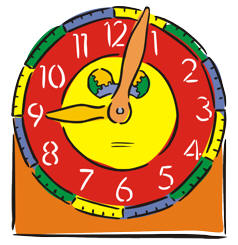- Another
864 Hours Wasted
-
By Barrington H. Brennen, July 18, 2008
Printer Friendly
PDF Document
 Since school closed in the
middle of June, about 864 hours have passed. How wisely have your children
used their 864 hours? Out of the 864 hours (36 days) your children should
have slept at least 360 hours. That’s about ten hours a day. “You’ve got
to be kidding,” I can hear you saying right now. Most children during this
first half of the summer vacation would have only slept about 180 hours
(five hours a day) and have watched a minimum of 300 hours of television.
That’s at least eight hours of television each day. If your child was in
school during that same period, that child would have spent 300 hours in the
classroom. While in the classroom, the child is learning, growing, and
developing social and academic skills useful for a lifetime. During the
first six weeks of summer vacation, 300 hours of television watching does
not provide the same developmental opportunity. In fact, it would
have been more destructive intellectually and emotionally. Since school closed in the
middle of June, about 864 hours have passed. How wisely have your children
used their 864 hours? Out of the 864 hours (36 days) your children should
have slept at least 360 hours. That’s about ten hours a day. “You’ve got
to be kidding,” I can hear you saying right now. Most children during this
first half of the summer vacation would have only slept about 180 hours
(five hours a day) and have watched a minimum of 300 hours of television.
That’s at least eight hours of television each day. If your child was in
school during that same period, that child would have spent 300 hours in the
classroom. While in the classroom, the child is learning, growing, and
developing social and academic skills useful for a lifetime. During the
first six weeks of summer vacation, 300 hours of television watching does
not provide the same developmental opportunity. In fact, it would
have been more destructive intellectually and emotionally.
During the past 846 hours,
your children would have pushed out of the brain at least 40% of what they
have put into it during the school year. This is according to a research
done at Johns Hopkins University. Many teachers admit that for the first
few weeks in school, they spend lots of time reviewing the material they
taught before the school year ended. It is often wasted time. Unless the
long vacations are better organized to provide mental growth, teachers will
continue to waste time teaching and re-teaching.
Sadly, some
children would have spent only 1.8 hours reading the Bible during the
same time period (864 hours).
With
300 hours of television viewing and 1.8 hours of Bible reading, which one is
more influential in their lives? There is a possible that the majority of
Children would have not yet opened the Bible to read voluntarily during the
summer. But like a trained robot, their hands would have turned on and off
the television set at least 100 times.
-
STRUCTURE
-
How can you help your children retain
during the summer vacation more of what they have learned during the
school year? There are about 43 more days before school re-opens.
That’s another 1032 more hours to provide organized activities that can
enhance your children both intellectually and emotionally. I recommend
that your children watch no more than 150 hours of television between
now and the day school opens for the new school year. They should sleep
at least 430 hours (10 hours a day) and not 215 (five hours a day), what
many children would normally do. Here are more recommendations for the
remaining part of the summer vacation:
-
Make sure your children read at least two
hours for every hour they spend watching television.
-
Have your own “Summer Reading Project.” Let
your children choose a new book to read and provide a short summary of the
book at the end of the summer.
-
Between now and September 1, have at least
144 hours of television black-out time. That’s at least one entire day out
of every week without the television.
-
Organize local cultural tours of Nassau or
The Bahamas. Plan to spend about 15 to 30 hours during the remaining weeks
visiting historical sites, government ministries, art and cultural museums,
for example.
-
Find fun toys, games, activities for
children to do on the outdoor every day.
-
Make sure, as parents, you spend at least
one to two hours each day playing, reading, or working with your children.
-
If the children are old enough, make sure
they have at least five hours a day of work on a job or at home.
-
One hour each week for the rest of the
summer, let your children review something they have learned during the
school year.
-
Three weeks before school begins, make sure
your children spend about 20 to 30 minutes every other day reading,
planning, and studying from books for the new school year.
-
Enroll your children
in a supplemental education program such as Oxford Learning.
-
OTHER CREATIVE THINGS TO DO
-
Here are a few more creative activities to
make the summer months fun and educational. Let your children learn the
local and scientific names of ten trees and ten birds in your
neighborhood. Help your children create a scrapbook of their summer
activities (photos, newspaper clippings, etc.).
 Let your children write a new story, adding a new paragraph each day.
Let them read the story to family members during an end-of-summer
party. Go on a one-day trail walk and let them report on every new
thing they have observed—birds, plants, rocks, insects, trees, etc.
Let your children write a new story, adding a new paragraph each day.
Let them read the story to family members during an end-of-summer
party. Go on a one-day trail walk and let them report on every new
thing they have observed—birds, plants, rocks, insects, trees, etc.
-
-
THE MISTAKE
-
Parents make a big mistake each year by
not providing structure during the summer months. They drop all guards
and standards, thinking it is best for their children. This is
detrimental to children’s welfare. Although the structure can be
different during the summer months, the principles are to remain. That
is, children should obtain sufficient rest, nutrition, social and
intellectual stimulation. Too many children learn negative habits
during the summer months that would affect their lives forever. If only
they had parents who cared enough and were wise enough to provide the
same standard and structure they did during the school year! Parents,
this information in this article is relevant for students in elementary
and secondary schools (ages 5 to 18). No one is exempted.
-
Barrington Brennen is a
marriage and family therapist. Send your questions and comments to
P.O. Box CB-13019 or email at
question@soencouragement.org or call 1-242-323 8772 or visit the website
www.soencouragement.org
|
|